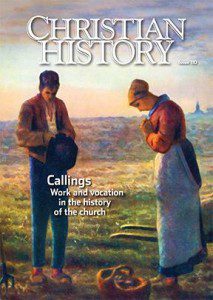 This is one more excerpt from our friends at Christian History Institute and their great new issue of Christian History about work, calling, and vocation in the history of the church. (The deadline to sign up and get a copy is ⇒TODAY⇐, and you can do that here.)
This is one more excerpt from our friends at Christian History Institute and their great new issue of Christian History about work, calling, and vocation in the history of the church. (The deadline to sign up and get a copy is ⇒TODAY⇐, and you can do that here.)
In 1530 Martin Luther wrote a treatise, “On Keeping Children in School”--ironically, arguing that young men should stay in school so that they could become preachers like himself–in which he also commented on the high regard in which he held every vocation. It makes interesting reading–especially in contrast to the early church’s opinions on the same issues, which we posted in this space about a week ago.
This is why I hold that there was never a better time to study than right now, not only because knowledge is so abundant and cheap, but also because of the great wealth and honor to which it leads. Those who study in these times will become so highly prized that two princes and three cities will yet compete for one scholar. For whether you look above you or about you, you find that in these next ten years countless offices will be waiting for educated men; yet very few are being trained to fill them. And not only has God appointed such great wealth for schools and scholars, but it is honorable and divine wealth, earned in a divine and honorable estate by many glorious, good, and useful works which please God and are a service to him. The avaricious man, on the contrary, earns his wealth with spite (even though his works are not godless and sinful) and with hateful works, about which he cannot have a glad conscience or say that they are a service of God. For my part, I would rather earn ten gulden by a work that is a service of God, than a thousand gulden by a work that is not a service of God but serves only self and Mammon.
Beyond this honestly gotten wealth, there is also the honor which accrues to them. Chancellors, city clerks, jurists, and the people who hold such offices also sit in high places and help to counsel and rule, as has been said. They are in actual fact lords upon earth, even though they are not that by virtue of their own person, birth, or estate. For Daniel says that he had to do the king’s work [Dan. 8:27]. And that is true: a chancellor must go about the work or business of the emperor, king, or prince; a city clerk must do the work of the council or the town. And they do this with God and with honor, to which God adds blessing, good fortune, and success. And when an emperor, king, or prince is not at war but simply goes about the business of ruling in accordance with the law, what is he but a clerk or jurist, so far as his works are concerned? He is dealing with the law, and that is the work of a clerk or jurist. And who actually rules the land and people in time of peace? Is it the fighting men or their officers? I think it is the pen that does it. And what is the avaricious man doing in the meantime with his Mammon? He attains no such honor but defiles himself all the while with his rust-eaten money [Matt. 6:19].
The Emperor Justinian himself declares, “Oportet maiestatem imperatoriam non solum armis decoratam, sed etiam legibus armatam esse.” “Imperial majesty,” he says, “must not only be adorned with arms, but also armed with laws.” See how marvelously this emperor turns his words about. He calls the laws his armor and weapons, and he calls arms his decoration and adornment; he would make his clerks his knights and fighting men. That is excellently put, for the laws are indeed the true armor and weapons which maintain and protect land and people, yes, the empire and worldly government itself, as has been sufficiently stated above. Wisdom is indeed better than might [Eccles. 9:16], and pious jurists are the true knights who defend the emperor and the princes. One could cite many passages to this effect from the poets and the histories, but it would take too long. Solomon himself declares in Ecclesiastes 9[:15] that a poor man by his wisdom delivered a city from a mighty king.
By this I do not mean to say that we should despise, reject, or do away with soldiers, fighting men, and those whose business is war. They too, when they are obedient, help with their fist to maintain peace and protect things. Every occupation has its own honor before God, as well as its own requirements and duties. For once, though, I must also praise my own – because my neighbors have fallen out with it and there is danger that it may come into contempt – even as St. Paul also praises his office so constantly that some think he goes too far and is guilty of pride. Whoever wants to praise and honor soldiers and the fist will find ground enough for doing so, as I myself have – I hope – intentionally and extensively done in another little book. For the jurists and pen-pushers do not please me either when they so praise themselves as to despise or ridicule other estates, as if they were everything and no one else in the world amounted to anything except themselves, as the “shavelings” and indeed the whole papacy used to do. All the estates and works of God are to be praised as highly as they can be, and none despised in favor of another. For it is written, “Confessio et magnificentia opus ejus, ” “What God does is fine and beautiful”; and again in Psalm 104[:31], “God rejoices in his works.” These ideas ought to be impressed particularly by the preachers on the people from their youth up, by schoolmasters on their boys, and by parents on their children, so that they may learn well what estates and offices are God’s, ordained by God, so that once they know this they will not despise or ridicule or speak evil of any one of them but hold them all in high regard and honor. That will both please God and serve the cause of peace and unity, for God is a great lord and has many kinds of servants.












